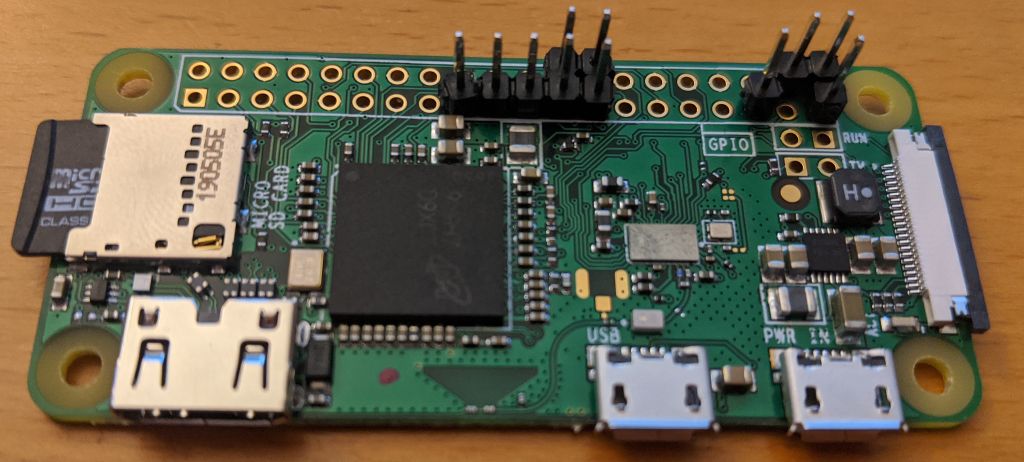Difference between revisions of "Ubiquiti NanoStation 5AC Loco"
| Line 42: | Line 42: | ||
The Nanostation has a Macronix MX25L12835F rom chip [datasheet https://www.macronix.com/Lists/Datasheet/Attachments/7397/MX25L12835F,%203V,%20128Mb,%20v1.6.pdf], which is an SPI chip with 16 connectors good for 128 Mbit of storage. | The Nanostation has a Macronix MX25L12835F rom chip [datasheet https://www.macronix.com/Lists/Datasheet/Attachments/7397/MX25L12835F,%203V,%20128Mb,%20v1.6.pdf], which is an SPI chip with 16 connectors good for 128 Mbit of storage. | ||
| − | We can use [ | + | We can use [https://flashrom.org Flashrom] running on a raspberry pi to read and write that chip, if we hook up the Pomona 5252 test clip to the MX25L12835F and connect it to the correct [https://pinout.xyz/ SPI pins] on the pi: |
| − | [[File:raspberry-pi-pinout.png]] | + | [[File:raspberry-pi-pinout.png|inline|raspberry pi GPIO pinout]] |
| + | |||
| + | A Raspberry Pi Zero W with SPI headers populated: | ||
| + | |||
| + | [[File:raspberry-pi-zero-w-with-spi-headers-populated.jpg|inline|1024px|A Raspberry Pi Zero W with SPI headers populated]] | ||
| + | |||
| + | Useful resources: | ||
| + | * [https://www.flashrom.org/RaspberryPi Flashrom page on using the Raspberry Pi as a flashing tool]] | ||
== Condensed Command-list == | == Condensed Command-list == | ||
Revision as of 22:08, 4 January 2020
The NanoStation 5AC Loco is a directional, weather resistant, PoE powered radio with a beam width of 90 degrees and a secondary omnidirectional radio. This makes it useful for simultaneously meshing on one radio while providing an access point for client devices on the other.
If you're in a pickle, and need to download opkg files for an offline NanoStation, the architecture is MIPS 24KC.
Contents
Files
MassMesh Firmware (Factory) (Latest)
MassMesh Firmware (Sysupgrade) (Latest)
Flashing
From Stock Firmware
- Download the Stock Firmware Image v8.5.0.36727 from above as well as the MassMesh Factory image file
- Power on the NanoStation via a PoE injector and connect the other side of the PoE injector to a computer
- Assign a static IP/netmask of
192.168.1.25/24to the computer - Use a browser to visit http://192.168.1.20/
- Login using the set password or default credentials
ubnt / ubnt - Navigate to settings and downgrade the stock firmware to v8.5.0.36727 using the downloaded image file
- Follow the instructions for enabling updates to the firmware on OpenWRT's website.
From OpenWrt
- Download the latest MassMesh Sysupgrade firmware file from above
- Connect to the device and navigate to the IP address of the device
- Note: MassMesh MeshRadio firmwares use an IP of 192.168.2.1. To access the administration UI, set an ip/netmask of 192.168.2.10/24 and browse to http://192.168.2.1/
- Navigate to System → Backup / Flash Firmware → Actions: Flash new firmware image
- Choose the sysupgrade file previously downloaded and click Flash
- Wait for the device to complete and reboot
With an external programmer
When your nanostation is bricked, or if the stock firmware won't let you flash our custom firmware, you can use the In-System Programming (ISP) technique to reflash the device (see also the Flashrom wiki. You're going to need:
- a Pomona 5252 test clip (https://www.digikey.com/product-detail/en/pomona-electronics/5252/501-2059-ND/745103), ~$16
- a raspberry pi (e.g. a zero w) ~$10
- some header pins and prototyping wires to connect everything
The Nanostation has a Macronix MX25L12835F rom chip [datasheet https://www.macronix.com/Lists/Datasheet/Attachments/7397/MX25L12835F,%203V,%20128Mb,%20v1.6.pdf], which is an SPI chip with 16 connectors good for 128 Mbit of storage.
We can use Flashrom running on a raspberry pi to read and write that chip, if we hook up the Pomona 5252 test clip to the MX25L12835F and connect it to the correct SPI pins on the pi:
A Raspberry Pi Zero W with SPI headers populated:
Useful resources:
Condensed Command-list
Flash The Stock Ubiquiti Firmware via TFTP
wget https://dl.ubnt.com/firmwares/XC-fw/v8.5.0/WA.v8.5.0.36727.180118.1314.bin cp https://dl.ubnt.com/firmwares/XC-fw/v8.5.0/WA.v8.5.0.36727.180118.1314.bin firmware.bin sudo apt install tftp tftp tftp> connect 192.168.1.20 tftp> rexmt 1 tftp> timeout 60 tftp> binary tftp> put firmware.bin
Flash The Mass Mesh Firmware
wget https://github.com/MassMesh/meta-imagebuilder-artifacts/raw/master/massmesh/meshradio/ubnt_nanostation-ac-loco/openwrt-massmesh-meshradio-ath79-generic-ubnt_nanostation-ac-loco-squashfs-factory.bin scp openwrt-massmesh-meshradio-ath79-generic-ubnt_nanostation-ac-loco-squashfs-factory.bin ubnt@192.168.1.20:/tmp ssh ubnt@192.168.1.20 hexdump -Cv /bin/ubntbox | sed 's/14 40 fe fe/00 00 00 00/g' | hexdump -R > /tmp/fwupdate.real chmod +x /tmp/fwupdate.real /tmp/fwupdate.real -m /tmp/openwrt-massmesh-meshradio-ath79-generic-ubnt_nanostation-ac-loco-squashfs-factory.bin


